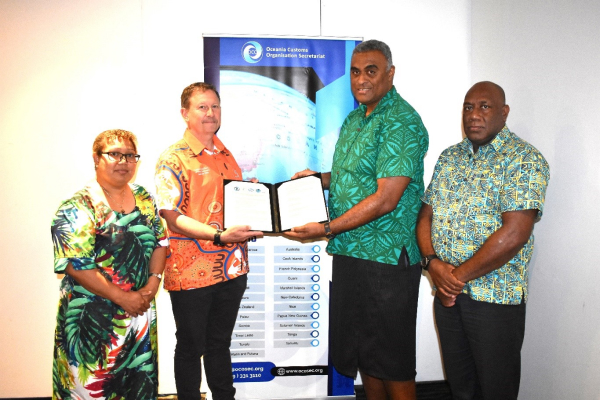Suva, Fiji, November 25, 2023: Transnational Organized Crime (TOC) poses a significant and growing threat to national and international security, with dire implications for public safety, public health, democratic institutions, and economic stability across the globe. Accelerated globalization has significantly increased our Blue Pacific’s exposure, creating an enabling environment for the proliferation of these crimes.
As a result, the Oceania Customs Organisation (OCO), Pacific Islands Chiefs of Police (PICP) and the Pacific Immigration Development Community (PIDC) recently welcomed the Pacific Islands Forum Fisheries Agency (FFA) into their Declaration of Partnership on Regional Security.
Combined efforts to jointly combat TOC will strengthen efforts to prevent and disrupt transnational organized crime groups taking advantage of the Pacific’s extensive maritime boundaries, differences in governance, and varying law enforcement capacities. Illegal, unreported, unregulated (IUU) fishing has detrimental effects on our people and the environment, and often has a nexus to TOC activities such as drug trafficking, human trafficking, and weapons smuggling.
The inclusion of FFA in the Partnership will act as a force multiplier and strengthen regional cooperation across law enforcement agencies. In practice, FFA members will be an additional set of eyes and ears collecting valuable information and intelligence for the Pacific Transnational Crime Network, as well as being able to access important criminal intelligence, to assist their IUU operations. In 2021, FFA estimated the value of tuna involved in IUU fishing activity in the Pacific was US$333.49 million, highlighting the substantial financial losses incurred due to illegal fishing practices.
Combatting TOC therefore requires a collective approach, and this agreement sends a clear and strong message of our joint intent to strengthen law enforcement to combat TOC, by enhancing our security cooperation and partnerships. It will also greatly assist with coordinating collective efforts, consistent with the commitment of Pacific Leaders on strengthening the existing regional security architecture.
“Transnational organized crimes and IUU fishing pose significant threats to our sovereignty and the welfare of our people,” FFA Director General, Dr Manu Tupou-Roosen said. “FFA’s partnership with OCO, PICP and PIDC aims to address these challenges for a safer and more prosperous future for Pacific Islanders. It is imperative that we work together to leverage our collective strength and resources to combat these threats and protect the interests of our region.”
The increased connectivity among the islands while increasing economic opportunities has also increased vulnerabilities. One significant consequence has been the rise in trafficking of methamphetamine, cocaine, and precursors with the Pacific also becoming a production site, giving rise to local drug markets, and increasing addiction rates.
Nancy Oraka, Head of Secretariat at OCO, emphasized the critical situation in the Pacific region, stating, “OCO’s partnership with PICP, PIDC and FFA is a crucial step towards addressing these concerns, securing our borders and safeguarding our nations’ well-being,” Ms. Oraka said. “We are the first line of defense for our Pacific Islands, and it is only right that we work together to combat these challenges that not only threaten our livelihoods but the future of our nations.”
PICP Secretariat Executive Director, Mr. Nicholas Brown emphasized the urgency of addressing transnational organized crimes and cross-border security challenges in the Pacific.
“This collaboration is pivotal in enhancing our collective efforts to reduce harm and combat the rising threats of drug trafficking, human trafficking, and other transnational crimes that exploit the vulnerabilities of our region. We stand united as Pacific Islanders to protect the safety and security of our communities,” Mr. Brown said.
This partnership provides a formal foundation for partners to enhance border security in the Pacific, particularly through the Pacific Transnational Crime Network. This is done through the promotion of multi-agency Transnational Crime Units, collecting, analyzing, and disseminating information and intelligence, the delivery of joint training, strengthening inter-agency cooperation, and the development of regional assessments and reports.
PIDC Head of Secretariat, Mr. Akuila Ratu highlighted the importance of safeguarding borders and addressing the complexities of migration in the Pacific.
“PIDC recognizes the critical need for coordinated action to tackle transnational challenges affecting our borders, including illegal immigration and human trafficking. Our partnership with OCO, PICP and FFA signifies a commitment to fortify our Immigration systems, ensuring the integrity of our borders while upholding the rights and safety of those who seek refuge within our nations,” Mr. Ratu said.
The collaboration between the partners includes enhanced surveillance and enforcement measures, intelligence sharing, capacity building, and joint operations. The commitment is to make a tangible difference in combating transnational organized crimes, illegal fishing, and cross-border security challenges.

